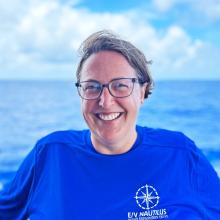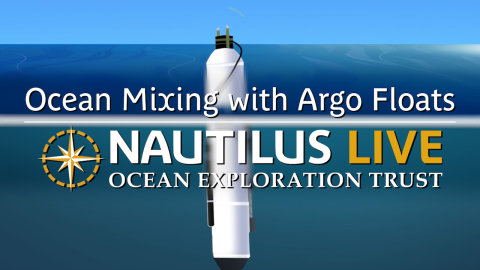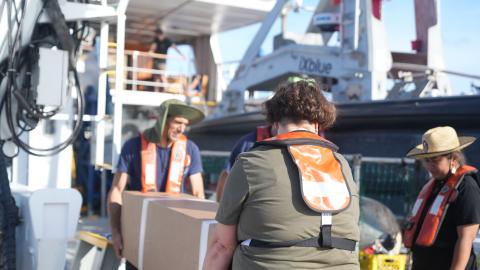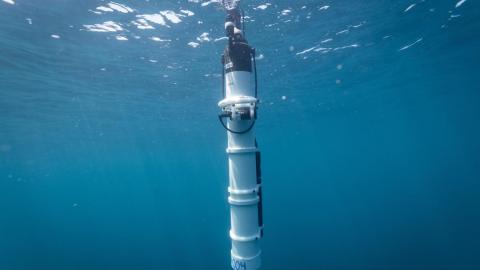
Melissa Miller
Tell us about your work/research. What kinds of things do you do?
I work for a robotic float program that deploys instruments to collect data on the temperature, salinity, dissolved oxygen, chlorophyll, pH, nitrate, and suspended particles in the ocean. The floats dive down to 2,000 meters and then come to the surface and send the information via satellite every 10 days. I'm deploying six of these floats from E/V Nautilus, which will travel with the currents and send in data for years to come. The information is all publicly available and different people use it in their research and climate models. The floats are great because they continue collecting data in all weather conditions and year-round, something that research vessels can't do. Previously, I went on many long research cruises to collect and analyze seawater for some of these same parameters. Now, I mostly go on shorter trips to deploy the floats.
What sparked your initial interest in your career?
The first book I ever remember reading was Dr. Ballard's book for kids about exploring the Titanic shipwreck. It was amazing to learn that humanity had explored more of the Moon than our own ocean. That fact, which is still true today, inspired me to a career in the ocean sciences. I wanted to be an explorer and was excited to learn there was still so much to learn right here on Earth.
Who influenced you or encouraged you the most?
I was lucky that no one every discouraged my interest in ocean science or told me I couldn't do it. Both of my parents have PhDs in the sciences, but I have forged my own path for the most part. There have been times where I wasn't sure or didn't want to put in the effort, but I've always managed to motivate myself to try new things and work towards my goals.
What element of your work/study is the most fascinating?
The most fascinating thing about my work with these robotic floats is just to imagine all of them out in the ocean, working away. The last we see of the floats is as we deploy them from ships and I like to picture them drifting in the ocean depths, tasked with their mission to take measurements and report in. It's fun to see where they end up and how much information they send in.
How did you get involved with the Ocean Exploration Trust?
The robotic float program relies on ships welcoming us onboard to deploy them as the floats as the ship carries on its own mission. We're grateful that E/V Nautilus is sharing valuable space and time to deploy the floats. We filled out a form stating our interest in this region and have been working with the science team to make sure we get our work down without interfering with the other plans.
What other jobs led you to your current career?
After undergrad, I worked in other jobs at my university but wanted to pursue ocean science. After a few years, I started volunteering at the Birch Aquarium in San Diego. I met great people and got the opportunity be a volunteer on a research cruise. I knew I was hooked and wanted to do that for a living! I was able to find a job at Scripps going to sea to collect and analyze seawater samples. We helped deploy the robotic floats for the program I now work for. I also started doing more writing and science communication from onboard, including blogging for the R/V Sally Ride when it was brand new. I love writing and do some freelance science writing too. All of those aspects help me in my current position.
What are your degrees and certifications?
Bachelor of Science in Ecology, Behavioral, and Evolution Biology from the University of California, San Diego 2003; Certificate in Science Communication from the University of California, San Diego 2020
What are your hobbies?
I love attending pop culture conventions like San Diego Comic-Con where I organize and moderate panel discussions about science. There's so many topics to talk about when it comes to science in our favorite movies and TV shows and it serves as a reminder that science is all around us and we already think about it in our daily lives. Even though I spend weeks or months at a time at sea, I still love to be near the ocean as much as possible and love to snorkel and paddle board at home in San Diego.
What advice would you give someone who wants to have a career like yours?
If you want a career in the ocean sciences, you can definitely have it! Find out all the information you can about the different aspects so you know what you're most interested in - there's biology, chemistry, physics, geology, computer science, and many more topics you can specialize in. Go to aquariums, take classes, volunteer, meet people who are also interested in the same things. I would also recommend thinking about how far you want to go in the academic realm. I am happy as a technician, working on other people's projects. But you do need a masters or PhD for certain careers and it's good to understand the commitment. Don't be put off by that though, there's a lot anyone can contribute to studying the ocean!
Expeditions
Melissa participated in the following Ocean Exploration Trust expeditions:



